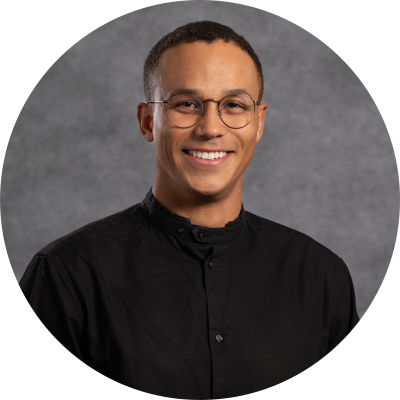
Tyler Hakeem Ogunmowo
I discovered a novel mechanism that enables neuronal contact sites called synapses to rapidly strengthen their signaling and maintain it during high demand. Synapses communicate via signaling molecules called neurotransmitter. Neurotransmitter is packed into synaptic vesicles, and upon neuronal activity, synapses fuse these vesicles at release sites and release neurotransmitter onto postsynaptic receptors for signal transduction. After vesicle fusion, these release sites become vacated and require new vesicles for continued neurotransmitter release. My work uncovered the function of two proteins that coordinate the replenishment of these release sites after their use by keeping so-called replacement vesicles nearby. This finding is significant to the field of synaptic cell biology as it provides an answer to a long-standing question — how is it that synaptic vesicles are kept close enough to release sites to rapidly replace the vesicles fused during the previous round of release? I conducted my research in the lab of Dr. Shigeki Watanabe.
Questions & Answers
Why did you choose Johns Hopkins for your work?
Primarily, I chose Johns Hopkins because of its large variety of strong graduate programs. My program, Biochemistry, Cellular and Molecular Biology, provided access to top-tier labs doing all kinds of incredible research, facilitated faculty interaction and mentorship, and introduced me to numerous other students inside and outside of my program with whom I could collaborate professionally and personally.
What does receiving this award mean to you personally and professionally? Do you have any connection with the particular award you received?
To me, this award helps me to truly appreciate the hard work I have conducted over my six-plus years here at Johns Hopkins. Given the length of a Ph.D., and the nature of the progress being incredibly steady, it is hard to recognize one’s achievements because rather than a small number of impactful moments, the success of a Ph.D. is made by the combination of a large number of little moments. Even the impact that should follow something like publishing a paper is diminished by the lengthy submission process. So, awards like this that succinctly recognize all of these small moments and their culmination are invaluable. Professionally, I feel honored to have my research recognized outside of my lab, and especially outside of my field.
What contributed to your project’s success?
I would like to say hard work and talent, but at times I was not working too hard and felt the opposite of talented. My interest in neuroscience led me to Shigeki’s lab, and my ability to do electron microscopy well kept me there, but from that point on, the people around me enabled my success. There are too many to mention, but the most important is my PI, Shigeki. Shigeki’s inimitable work ethic motivated me to pursue my project passionately. His scientific ability and intelligence were a constant boon to my scientific questions, knowledge and reasoning. His willingness to encourage me to have countless unique scientific experiences helped me grow and develop into my own type of scientist. So, because of Shigeki, the members of my lab and, through Shigeki, the countless others I met along the way, my project became successful.
What thoughts do you have about Young Investigators’ Day itself, as a celebration of the roles students and fellows play in research at Johns Hopkins?
I would like to see more of its kind. Students and fellows are the driving force behind research at Hopkins. Often, they are integral to every step of research. Their contributions can always be recognized more.
What has been your best/most memorable experience while at Johns Hopkins?
It’s a long list, but I would have to say my recent graduation was the highlight of my time here. However strangely, it took me some time for that to fully sink in.
What are your plans over the next year or so? Graduating, looking for faculty positions, etc.?
I am looking into a variety of career opportunities. Nothing is set in stone yet!
Tell me something interesting about yourself that makes you unique. Do you have any special hobbies, interests or life experiences?
I am not sure how special it is, but I am an avid rock climber and have traveled all over the world to climb!